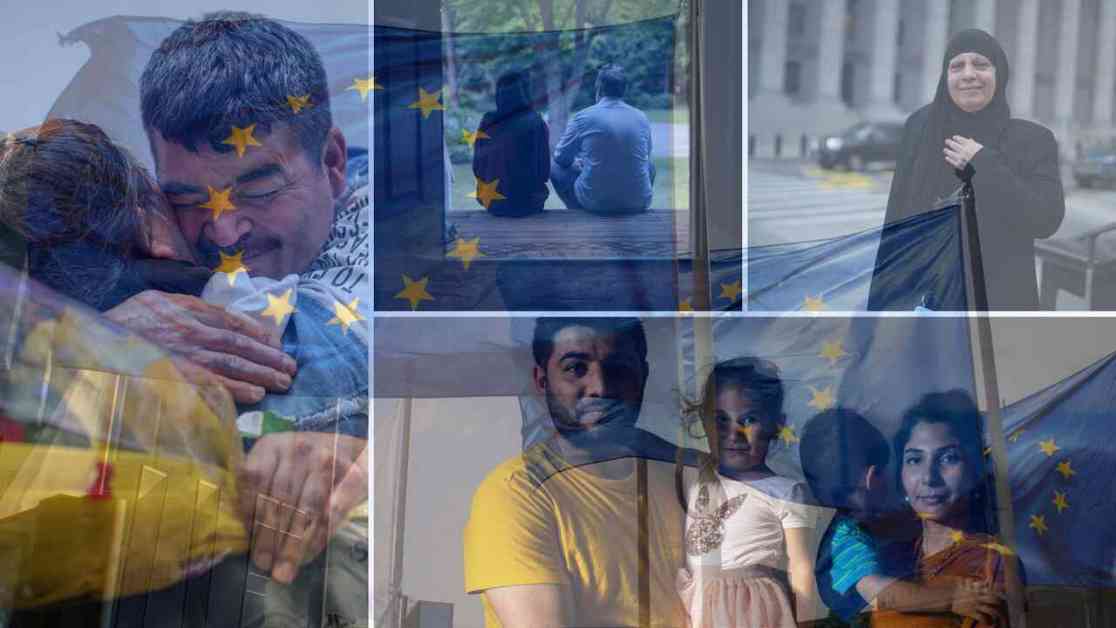On April 10, 2024, after years of intense negotiations, the EU Migration and Asylum Pact, despite many concerns from non-governmental organizations like IRC, was approved by the European Parliament. The pact includes comprehensive reforms of the Common European Asylum System (CEAS) and is expected to signify a “fresh start” in EU migration management – but can it succeed? Find out in this article what the CEAS reform entails, why it has such far-reaching consequences, and what demands IRC has for Germany for its implementation.
The final adoption of the pact has exacerbated the alarming erosion of the EU’s migration and asylum system – likely without being able to achieve its self-imposed goals of greater solidarity among member states: It is foreseeable that the pact will not lead to a fairer distribution of asylum seekers within the EU and thus “relieve” states at the EU’s external borders. On the other hand, numerous non-governmental organizations fear that the new regulations will lead to more human rights violations at Europe’s borders.
It is expected that through the CEAS reform:
– the right to apply for asylum will be further restricted,
– more people, including families and children, will be held in prison-like detention at the borders,
– asylum applications will not be fully and fairly processed,
– the number of unlawful pushbacks will increase,
– the processing of asylum applications will be further outsourced to countries that already host the largest number of asylum seekers.
What happens after the adoption of the pact?
The new regulations of the pact officially came into effect in June 2024. However, they will largely be applied in 2026 after a two-year transition period during which European laws will be converted into national legislation.
The implementation phase of the pact has begun with the introduction of the joint implementation plan by the European Commission. This is a roadmap for the implementation of the pact that the EU and its member states must undertake by June 2026. According to this plan, each member state is required to submit its national implementation plan by December 2024.
Should a member state fail to comply with the rules and regulations set out in the pact in the future, it could face legal action and infringement proceedings.
Why is a functioning European migration and asylum system so important?
In 2023, over 117 million people were forcibly displaced worldwide. UNHCR warns that by the end of 2024, more than 130 million people will be displaced – a devastating consequence of armed conflicts and political unrest, often exacerbated by climate change. The vast majority of people remain in their home regions, and only a very small number attempt to find refuge in Europe. However, European countries have not yet found functioning, dignified solutions for the reception of asylum seekers. Instead, EU and international laws are being circumvented, and daily human rights violations are occurring at European borders.
Given the rapidly increasing need for humanitarian aid and protection, it is more important than ever for the EU to develop a safe, orderly, and humane asylum and migration policy.
Learn more in IRC’s report.
What does the pact entail?
The pact consists of ten laws that reform the existing EU migration and asylum regime, the Common European Asylum System (CEAS):
– The Eurodac Regulation introduces a comprehensive IT system that stores and processes data from asylum seekers.
– The Screening Regulation describes the initial procedural steps for persons who have crossed the border “irregularly.”
– The revised Asylum Procedures Regulation sets out the procedures for individuals applying for asylum in a member state.
– The Regulation on the Administration of Asylum and Migration replaces the existing Dublin III Regulation and determines the responsibility of member states for processing an asylum application.
– The Crisis and Force Majeure Regulation regulates the preparation, emergency planning, and action in the event of a “crisis” at the EU’s external borders.
– The Recognition Regulation defines the requirements for individuals to receive international protection. It also establishes the rights and obligations of asylum seekers.
– The Reception Conditions Directive sets minimum standards for the support of asylum seekers and defines living standards that EU states must ensure.
– The Union Resettlement Framework, which could provide a structured, predictable way for some asylum seekers to arrive safely in the EU.
What should Germany consider when implementing the EU pact?
In the course of implementing the pact, IRC Germany demands guarantees from the federal government that the fundamental rights of asylum seekers are preserved and not further eroded.
A truly common, well-managed European asylum system should be established that places people at the center, upholds the right to asylum, and ensures that people are not sent back in danger.
Instead of trying to deter asylum seekers from coming to Europe at all costs, Germany and the EU should focus on preserving the fundamental rights and dignity of all asylum seekers. This requires urgent investments from the federal government to ensure that human rights standards – including access to a fair and comprehensive asylum process – are maintained.
This includes ensuring that asylum seekers:
– have access to information about their rights and options,
– are provided with free legal assistance,
– have the right to appeal negative asylum decisions,
– live in adequate reception conditions,
– have access to simple and fast family reunification.
Detention should only be used as a last resort, and effective alternatives to detention should be established.
The new screening and border procedures further systematize the detention of asylum seekers, including children, in the EU. If there are alternatives available, it is a violation of international law to detain asylum seekers. Furthermore, IRC’s experience in Greece shows that prolonged detention in detention facilities or closed camps has devastating effects on people’s mental health. Germany should advocate nationally and across Europe for the development of alternatives – such as community-based accommodation solutions and open reception centers – instead of relying on enforcement and coercion.
Lowering asylum standards should not become the norm.
The crisis regulation allows states to lower the standards set out in the pact in cases of “crisis, instrumentalization, and force majeure.” However, these terms are not clearly defined and leave a wide scope for interpretation. Based on this, deviations from existing asylum law could become more the rule than the exception. This would result in lowering standards for asylum processes and potentially prolonging the duration of asylum procedures. Germany should avoid this nationally and work at the European level to ensure that standards for asylum processes are not lowered. Germany should only declare a state of crisis in exceptional cases and work at the European level to ensure that it is not excessively invoked.
Pushbacks should be stopped, and the rights of asylum seekers at the borders should be upheld.
Germany should consistently oppose pushbacks at national and European levels. Pushback refers to the unlawful return of asylum seekers immediately after crossing the border without allowing them to apply for asylum. This practice occurs systematically at European external borders with the approval of many European member states, including Germany, and increasingly at the German-Polish border. If Germany wants to uphold human rights standards, it should end support for any measures or policies that lead to pushbacks or collective expulsions at German and European external borders. Germany should establish independent civil society mechanisms to monitor the human rights situation at the borders and properly investigate all allegations of human rights violations, including those resulting from pushbacks, and hold perpetrators accountable. Civilian search and rescue operations should be comprehensively state-funded by 2026 and beyond. Additionally, Germany should show solidarity with countries at the external borders and accept rescued individuals to a safe place rather than returning them to places where their lives are in danger.
Safe, complementary pathways should be expanded.
Germany should expand safe access routes so that asylum seekers are not forced onto dangerous routes to reach Europe. Complementary access routes, such as educational and work visas, should be promoted in addition to the territorial right to asylum. Furthermore, as announced in the coalition agreement, the federal government should simplify and expedite the family reunification process and consistently implement humanitarian admission programs such as the Afghanistan Federal Admission Program, rather than questioning their continued financing.
The protection of refugees should not be outsourced.
Germany should protect the rights of asylum seekers to seek asylum in Germany rather than discussing migration agreements that “outsource” border and migration management to third countries. If agreements with third countries are being discussed at the European level, Germany should make its support for these agreements contingent on upholding human rights standards and international law.
Resettlement should be expanded.
Germany should promptly and consistently implement the Union Resettlement Framework (URF) and participate extensively in the program in the long term. Resettlement refers to the organized, direct reception of particularly vulnerable people who cannot live safely in the country to which they have fled, even temporarily. In its implementation of the Union Resettlement Framework, Germany should:
– Fulfill its obligations consistently and monitor compliance with obligations more effectively and transparently. For 2024 and 2025, Germany has committed to 13,100 resettlement places.
– commit to more ambitious resettlement pledges in the future that correspond to Germany’s actual reception capacity and the increasing global need for resettlement.
– involve refugees and civil society in the design of resettlement programs and strengthen resettlement processes in Germany in the long term.
Dignified reception conditions should be comprehensively ensured nationwide.
Germany should ensure dignified reception conditions nationwide. This includes:
– providing adequate support to municipalities. Accommodating asylum seekers in remote and often overcrowded communal facilities should be avoided. Instead, decentralized accommodation solutions should be expanded.
– supporting refugees in accessing the labor market free from discrimination, including lifting a work ban, recognizing their education and qualifications, and providing further training and education.
– defining integration measures in collaboration with affected individuals and refugee-led organizations that focus on the strengths and needs of asylum seekers.
– ensuring comprehensive, diversity-sensitive, anti-racist education for all children and adolescents from early childhood education onwards.
Solidarity should not be for sale.
Germany should fulfill its mandatory solidarity contributions primarily or entirely through the relocation of asylum seekers under the relocation procedure. If financial contributions are considered, Germany should strictly ensure that the funds are not used for measures that could lead to pushbacks, detentions, or other human rights violations. This is especially true if the contributions are used to finance measures in third countries outside the EU.
Monitoring mechanisms to ensure compliance with fundamental rights should be established.
Germany should establish mechanisms to monitor fundamental rights to prevent the rights of asylum seekers from being violated. These mechanisms should be present at least during the entire screening and border asylum procedures, as provided for in the pact. Germany should also consider expanding the scope of application. To be independent and efficient, these mechanisms should involve NGOs and civil society actors from the outset and have clear consequences for member states that do not establish, cooperate with, or ignore these mechanisms.
Procedures for meaningful consultations with NGOs at the national level should be established.
The expertise of these groups should inform the planning of the pact’s implementation over the next two years and the reporting on its progress. The EU and its member states should work with refugee and refugee rights organizations throughout the process to ensure that the perspectives and needs of asylum seekers are at the center of policy and decision-making processes. They should collaborate with local organizations that represent and focus specifically on the most vulnerable groups and individuals, such as organizations led by and working with women, to promote stronger integration.
Related Articles:
– 7 Things to Know About Resettlement of Refugees in the EU
– Fact Check on Resettlement to Germany

















